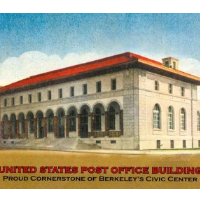Legislation Offers Hope that Historical Berkeley Post Office Won’t be Part of Nationwide Selloff

Congress may spare the century-old downtown Berkeley post office and some other historical buildings in its downsizing and selloff of the incredibly shrinking U.S. Postal Service (USPS) on the way to privatization.
Legislation in the House of Representatives, part of the $1.1-trillion omnibus appropriations bill (pdf) unveiled Monday, aims to slow the march to sell off 600 buildings nationwide that Congress itself initiated, according to the San Francisco Chronicle. Congresswoman Barbara Lee (D-California) said language in the bill, which reportedly has bipartisan support, would stop the sale of historic buildings until reports by the Inspector General and the Advisory Council on Historic Preservation are complete.
“Buildings like the Berkeley Main Post Office are central to our communities and our cities, and while the USPS continues to grapple with financial woes, it must not resort to selling off historic properties without complying with federal historic preservation laws,” Lee said.
Language inserted in the bill by the House Appropriations Committee would suspend sales until it has been determined “whether the Postal Service is complying with its statutory and regulatory requirements in the relocation of services, closure, and sale” of historic post offices.
It is conventional wisdom that the Internet, competition from the innovative private sector and sky-high pension costs of pampered federal employees are killing the Postal Service. Critics say the only hope is to slash costs, scale back services, sell off unnecessary assets and shift the business of mail delivery to more efficient private owners.
Critics of the critics dispute most every allegation made. The post office, they say, is being savaged for thinly-disguised political reasons, including the destruction of the largest organized labor force in the country, postal workers (40% of whom are minorities). The number one contributor to the Postal Service’s annual net operating loss, which currently runs in the billions of dollars, is a law passed by the Republican-controlled Congress in 2006.
The law forced the USPS—which pays its own way and does not receive money from the federal budget—to prefund its future health care benefit payments to retirees for the next 75 years. The Postal Service was ordered to pay for the benefits of workers it hasn’t even hired and do it an accelerated time frame, a requirement not demanded of any other federal government agency.
The law instantly put the post office on the verge of bankruptcy and unleashed a movement to villainize and privatize the service. Unions would take a beating, private carriers would get a boost and $85 billion in hard assets could be sold to those who would know how to properly monetize them.
The exclusive contract for handling sales of post office properties was given to a single outfit, C.B. Richard Ellis (CBRE), whose chairman is Richard Blum, husband of Senator Dianne Feinstein (D-California). Investigative journalist Peter Byrne wrote in his book “Going Postal” that 20% of the portfolio was sold to business partners or clients of CBRE, while it took up to a 6% commission in 34 of the 52 transactions. CBRE appeared to act as an agent for both the Postal Service and buyers in many of the transactions, contrary to customary property sales, according to Byrne:
“The sales were mostly of central downtown buildings, with parking, in wealthy or revitalizing neighborhoods that attracted restaurant, boutique, and residential developers, or modern, suburban office buildings and warehouses, also with ample parking that attracted high-tech industrial firms. In other words, the most saleable postal properties were the ones most likely to command prices that exceeded their assessed values.”
Protesters camped out at Berkeley’s downtown post office, a 1914 Renaissance Revival-style building, for 33 days in 2012 after it was designated to be sold. It was officially put up for sale last year. The city council has vowed to pass zoning laws to restrict the sale and sue if its legislative efforts fall short.
Congress approved a three-cent increase in the price of postage, to 49 cents, effective January 26, at the request of the Postal Service, which decried its “precarious financial condition.”
–Ken Broder
To Learn More:
Congressional Vote Blocks Berkeley Post Office Sale (by Bob Egelko, San Francisco Chronicle)
Congresswoman Lee Say Bill Urged USPS to Halt Sales of Historic Post Office Buildings (Postal Reporter News Blog)
U.S. Postal Service Home to 3 of 10 Fastest-Shrinking Jobs (by Danielle Kurtzleben, U.S. News)
The Corporatization of the Postal Service: Post Office Closures, Suspensions, Relocations, and Reductions in 2013 (Save the Post Office)
Going Postal (East Bay Express excerpt from a book by Peter Byrne)
Sen. Feinstein’s Husband Reaps Profits from Post Office Closings (by Ken Broder, AllGov California)
Congress Struggles to Deliver Solution to Postal Problem It Created (by Matt Bewig, AllGov)
- Top Stories
- Controversies
- Where is the Money Going?
- California and the Nation
- Appointments and Resignations
- Unusual News
- Latest News
- California Forbids U.S. Immigration Agents from Pretending to be Police
- California Lawmakers Urged to Strip “Self-Dealing” Tax Board of Its Duties
- Big Oil’s Grip on California
- Santa Cruz Police See Homeland Security Betrayal in Use of Gang Roundup as Cover for Immigration Raid
- Oil Companies Face Deadline to Stop Polluting California Groundwater





